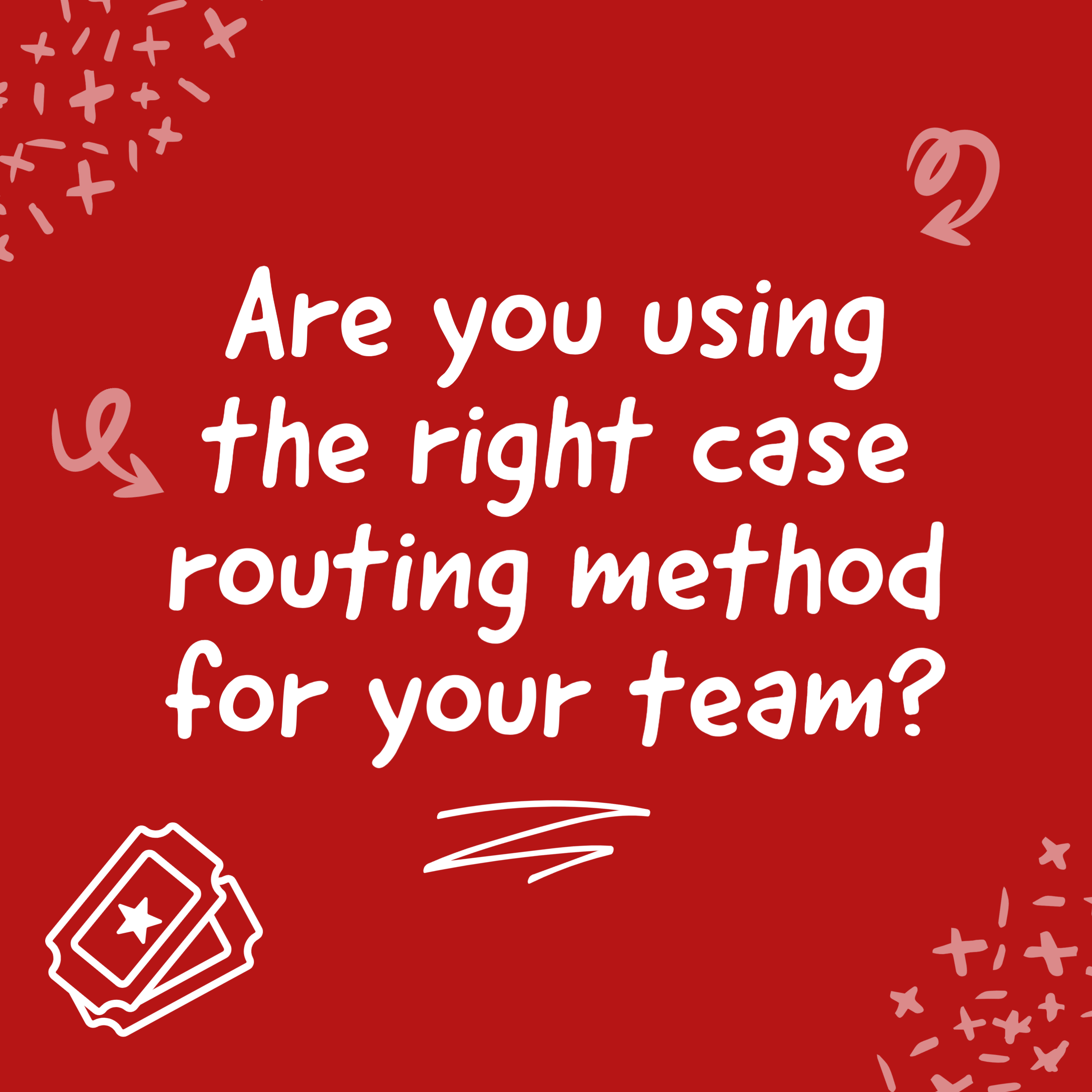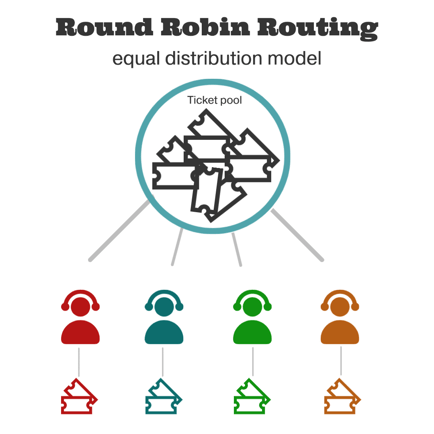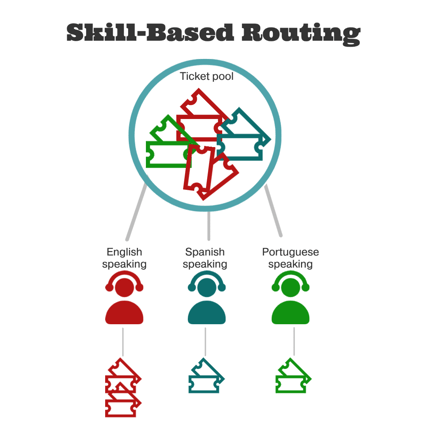

Most of us in the customer service field are pretty familiar with the concept of ticket or case routing - but are you using the method that is right for your team?
One of the simplest and most common ways companies handle cases is by sending all customer inquiries into one large pool where agents can either pull cases or a managing agent can push them manually to different teams or agents.
While there isn’t anything wrong with this method, there are some issues that can occur - like agents first selecting the easier-to-work cases, leaving the more complex (and often important) ones for last.
This can ultimately lead to decreased team efficiency, and most importantly a poor customer experience.
69% of customers have abandoned a brand because of a negative customer service experience. (ArenaCX)
If you’re not currently leveraging routing or are considering a new way of routing customer inquiries, here are a few examples of routing techniques that could help your team
-
-
- save time,
- increase efficiency, and
- improve your time to interaction with your customers.
-
What is Ticket Routing and Why Use It?
According to Helpshift, ticket routing is defined as the process of setting rules around how tickets are assigned to particular departments, agents, and functions. The possibilities of how to route tickets is essentially endless when considering the number of rules a team could set.
Customer service leaders employee ticket routing methods to improve efficiency, save money, and improve the customer experience. Because tickets are routed with intention they are usually received faster and by the right departments and even specific agents to best handle those inquiries.
When routing is automated through set rules within your ticketing platform, cases are assigned with little to no manual input necessary, leaving very little room for human delay or error during the routing process.
Which Routing Method Should You Use?
There are many ways to route tickets but first it’s important to decide if it makes sense for your team to take a more manual or automated approach.
Often, larger businesses who receive hundreds of customer cases per day opt for the automated approach to help them make sorting tickets a much quicker task, while businesses who receive very few cases may not always find as much value in automation.
-
-
-
- round robin,
- skills-based,
- category/keyword, and
- performance-based.
-
-
The method that’s right for you depends on a numbed of factors like the industry you're in, type of questions your customers have, the size of your team, whether your company uses outsourcing partners to help, and how your operations are delivered.
Types of Routing Methods to Consider
A Round Robin Approach
One popular method is called a round robin approach. This method takes each case and distributes them evenly among the agents in your network. This can be done through manual assignment or through an automated process.
To help visualize this approach, consider this example: You have a queue of 8 tickets and you have 4 agents working tickets.

Agent A: Ticket 1
Agent B: Ticket 2
Agent C: Ticket 3
Agent D: Ticket 4
All subsequent tickets get routed in the same manner.
Agent A: Ticket 5
Agent B: Ticket 6
Agent C: Ticket 7
Agent D: Ticket 8
And so it goes sending each incoming ticket to the next agent following this equal distribution model.
Round Robin follows relatively simple logic and can work well when you have a team of agents who share the same skill and expertise. When there is no major difference in the level of cases agents can handle, this approach ensures that each person receives a fair number - distributing work equally.
However, this approach can fall a bit flat if you have agents of different skill levels or many different types of cases that fluctuate greatly in level of technicality or skill required to answer the inquiry.
"[The Round Robin approach] assigns tickets without regard for complexity, time-consumption, or necessary expertise.” (Zendesk)
When considering the Round Robin approach in your own operations consider the technical level of these tickets and assess the knowledge, experience, or special skills required to thoroughly answer the types of questions your customers ask.
If all of your agents are fully equipped, then this can be a great method. Otherwise, it might be smart to consider a more sophisticated method of routing, like skills-based.
Good for: Teams whose agents all share the same or similar levels of skill and are equipped to handle the same level of customer inquiries.
Skills-Based Routing
RingCentral offers a strong explanation of skills-based routing: “Skill-based routing is a call routing strategy where customers are assigned to agents with the most relevant skills for handling their concerns.”
If you work in an industry where customer inquiries range vastly in level of technical difficulty or languages spoken, this might be a great choice for you. You wouldn’t necessarily need every agent to be able to answer a Tier 3 ticket when the majority of your tickets are Tier 1.
If the skill-level of all agents isn’t completely equal or you have distinct teams who’re able to handle different levels of technical requests, applying an approach that routes based on a specific skill would benefit your team - and the customer - more than a round robin approach.
Customers would get answers more quickly by having their case routed to the right team or agent automatically rather than, for example, being routed first to someone unequipped to handle the inquiry who then has to pass the ticket along to the right department or agent.
 Similarly, you may want to consider using skills-based routing if your company has customers who speak different languages. If you have a team that speaks English, one that speaks Spanish, and one that speaks Portuguese, you wouldn’t want to use a round-robin approach to send equal cases to each team as they come in.
Similarly, you may want to consider using skills-based routing if your company has customers who speak different languages. If you have a team that speaks English, one that speaks Spanish, and one that speaks Portuguese, you wouldn’t want to use a round-robin approach to send equal cases to each team as they come in.
Instead, you'd route based on the language of the customer to the team or agent who could help.
Good for: Teams comprised of agents with different skill-sets and abilities.
Category or keyword routing
Another popular, and slightly more advanced way, to route your cases is by category or keyword. This method sorts your tickets by identifying a specific word or phrase used in the inquiry and then sends the support interaction to an assigned team or agent.
An example of this is if a company has different departments that handle different types of tickets like billing, returns, or technical. Using category or keyword routing, rules can be set to identify if someone uses words or phrases like “incorrect bill”, “invoice”, “charged too much”, to categorize and then route tickets to your billing support team.
For anything that does not fit into the categories or rules that have been pre-determined by your team, they can be sent to certain agents or teams who can then manually route them to the correct department and create new rules based on the trends they encounter.
This type of process takes a little while to establish, but ultimately captures the most common inquiries, leaving very little manual work after a few months of determining and setting rules to capture the right keywords and phrases.
Good for: Companies with different departments who handle different inquiry types, such as billing vs. technical support vs. general inquiries, etc.
Performance-based routing
Here at ArenaCX, we believe in the benefits of effective routing so much that we developed our own exclusive smart routing tool that routes tickets based on how well cases of certain types have historically been handled in the past by certain agents or teams.
We call this method performance-based routing, available for free to ArenaCX marketplace members.
This smart routing solution underpins the entire marketplace and incentivizes partners and agents to perform better and better so that they continue to be routed a larger share of customer cases.
Here's an example: If you have 3 partners and each one is assigned a relatively equal number of tickets but Partner A starts underperforming (receiving low CSAT ratings and NPS scores, etc.), the number of cases they were receiving will be dispersed to Partner B and Partner C until Partner A gets their scores up again.
Through this method, teams and agents are continuously incentivized to do their best to keep their share of tickets and earn more money for their company. The video below demonstrates this example further:
Good for: Performance-based routing can be used effectively by companies and teams of all sizes and industries.
To see how performance-based routing has impacted real customers, read how Surprise.com saw a 20% increase in agent productivity after using ArenaCX‘s smart routing solution.
Today, there are countless routing options available including more advanced methods - like ArenaCX's performance-based routing - and others that leverage the use of smart routing and artificial intelligence to help sort your cases with little to no manual effort, like Zendesk’s routing solution, among others built into popular ticketing platforms.
No matter which way you choose to route your tickets based on the needs of your team, the benefits of effective routing are abundantly clear.
Have you found a routing solution that works wonders for your company’s operations? Which one works best for you? Share your routing best practices in the comments!
Interested in learning more about how ArenaCX's performance-based routing solution could integrate into your existing ticketing platform? Schedule a 15-minute discovery call to learn more.
Subscribe and stay up to date
receive essential emails.






Speak Your Mind